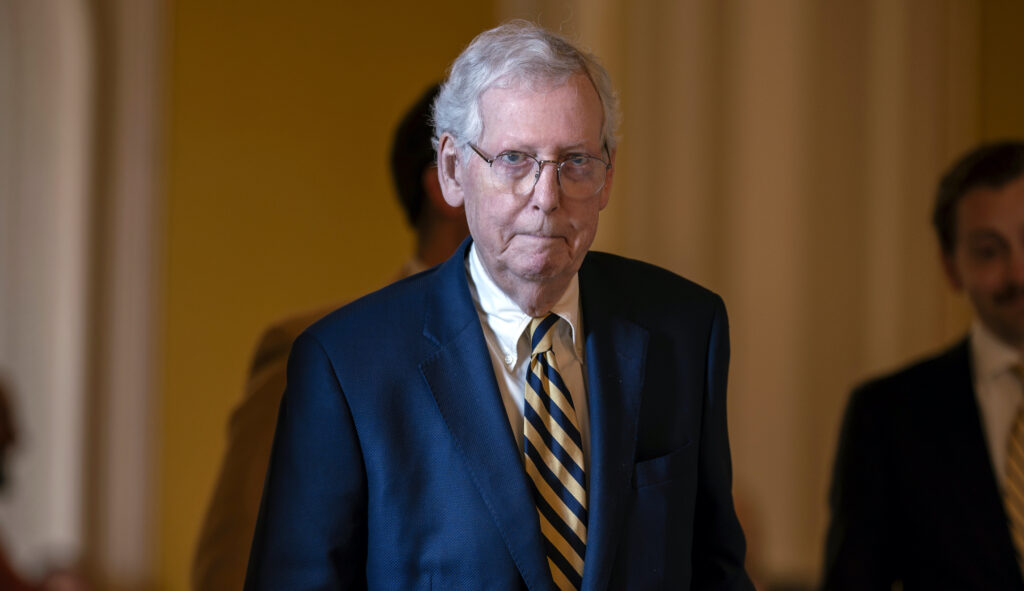Senate Republicans appear likely to tank a Wednesday test vote on the newly revamped Ukraine-border bill, the latest sign of trouble for the legislation just one day after its release.
Republicans emerged from a GOP conference meeting on Monday night leaning toward voting “no” en masse when the Senate takes its first procedural step toward advancing the legislation.
The move is aimed at giving members more time to review the 300-plus-page bill, feeding into conservative gripes that the chamber is being rushed into a decision.
“I would anticipate Wednesday the cloture vote does not pass,” said Sen. James Lankford (R-OK), the chief Republican negotiator for the border portion of the legislation.
“I think it’s the most likely scenario,” Lankford added.
While Republicans do not control the chamber, they can block the legislation from moving forward with 41 votes.
Of course, the Wednesday vote would simply begin debate on the bill, which could take weeks to consider in the upper chamber. But some Republicans, such as Sen. Mike Rounds (R-SD), view the threat of a “no” vote as leverage to demand an open amendment process.
Leadership has not said it will make that demand, but the conference debated the tactic at the meeting, according to a source in the room.
Senate Majority Whip Dick Durbin (D-IL) told reporters he was “not opposed” to amendments earlier in the day but expressed reservations that Republicans would abuse the process to oppose the bill.
“I came to the Senate when amendments were normal. I’d like to see us return to that,” he said. “But I don’t want this to turn into a filibuster, which it easily could.”
A sizable portion of the Republican conference is against the bill due to the border component, which they claim would give cover to the White House without actually solving the border crisis.
That’s to say nothing of the rising conservative skepticism toward the war in Ukraine as it enters its third year.
Demanding a delay in the test vote would give lawmakers more time to review the text, but it would also provide Republican leadership more time to weigh a path forward.
Twenty or so senators, nearly all Republicans, have come out against the bill, while most of Senate Minority Leader Mitch McConnell’s (R-KY) leadership team is publicly undecided or opposed.

The opposition was, to some extent, to be expected, but McConnell is also up against a pressure campaign by two of the party’s top leaders, Speaker Mike Johnson (R-LA) and former President Donald Trump, who want to see the legislation die in the Senate.
Sen. Roger Wicker (R-MS), an adviser to McConnell, summarized the bill’s prospects this way coming out of the minority leader’s office on Monday afternoon: “I think the proposal is dead.”
Sen. Joni Ernst (R-IA), also part of McConnell’s leadership team, was nearly as bleak.
“All I can say is James Lankford has done a tremendous job in working with his Democratic counterparts, and hopefully we can find a way forward, but I don’t know if it’s possible,” she said.
Senators described the conference meeting, during which elevated voices could be heard coming out of the room, as a “robust discussion.” Members were urged not to undermine the conference in public, according to the source in the room, following hours of vocal criticism by conservatives.
The desire for more time, in part, is about socializing the agreement with rank-and-file members. “There was a debate over provisions, substance, process — we didn’t even get to discussing Ukraine or Taiwan or Israel. And we’ve got more discussion to do on the border,” said Sen. John Kennedy (R-LA), who will vote against cloture on Wednesday.
“I mean, it’s just clear that we’ve got a lot of work to do,” he added.
The challenge for McConnell has always been winning the votes of a majority of his conference, or 25 of the Senate’s 49 Republicans. The minority leader could deliver fewer, just enough for the bill to pass the Senate’s 60-vote threshold, but Lankford doubted the conference would take that approach.
“Yeah, we’re not gonna have a small minority of Republicans move because it’s absolutely not going to work in the House at all. There’s no chance of that,” he said. “We’ve got to have a strong vote over here as well.”
CLICK HERE TO READ MORE FROM THE WASHINGTON EXAMINER
Senate Minority Whip Thune (R-SD), who is himself undecided on the bill, conceded that Johnson’s declaration that the bill is “dead on arrival” in the House has affected the calculus in the Senate.
“Obviously people want a result; they want an outcome if we’re going to go through this process,” he said. “And so, to make law around here, you got to get it through the House and the Senate.”
Emily Jacobs contributed to this story.

